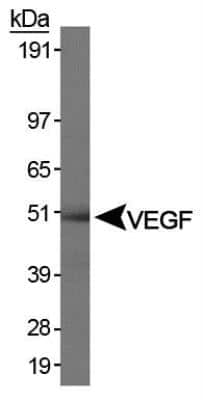VEGFA Mouse Monoclonal Antibody [Clone ID: VG76e]
Frequently bought together (2)
beta Actin Mouse Monoclonal Antibody, Clone OTI1, Loading Control
USD 200.00
Transient overexpression lysate of vascular endothelial growth factor A (VEGFA), transcript variant 6
USD 436.00
Other products for "VEGFA"
Specifications
| Product Data | |
| Clone Name | VG76e |
| Applications | ELISA, ICC/IF, IHC, WB |
| Recommended Dilution | Immunohistochemistry-Paraffin: 1:200, ELISA: 1:100-1:2000, Immunohistochemistry: 1:200, Immunocytochemistry/ Immunofluorescence: 1:50-1:200, Western Blot: 0.5-2ug/ml, Radioimmunoassay |
| Reactivities | Human, Bovine, Porcine, Sheep |
| Host | Mouse |
| Isotype | IgG1 |
| Clonality | Monoclonal |
| Immunogen | Recombinant human VEGF189 expressed in E.coli [UniProt# P15692] |
| Formulation | PBS containing 0.05% BSA, 0.05% Sodium Azide. Store at 4C short term. Aliquot and store at -20C long term. Avoid freeze-thaw cycles. |
| Concentration | lot specific |
| Purification | Protein G purified |
| Conjugation | Unconjugated |
| Storage | Store at -20°C as received. |
| Stability | Stable for 12 months from date of receipt. |
| Predicted Protein Size | 40 kDa |
| Gene Name | vascular endothelial growth factor A |
| Database Link | |
| Background | VEGF (vascular endothelial growth factor) is a homodimeric, disulfide-linked glycoprotein growth factor that plays a critical role in angiogenesis, vasculogenesis and endothelial cell growth through induction of endothelial cell proliferation and blood vessels permeabilization, cell migration promotion as well as inhibition of apoptosis. VEGF can bind to FLT1/VEGFR1 and KDR/VEGFR2 receptors, heparan sulfate and heparin. Its isoforms VEGF189, VEGF165 and VEGF121 are widely expressed, whereas, other isoforms VEGF206 and VEGF145 are not very common. The basic isoform VEGF189 is cell-associated after secretion and is bound avidly by heparin and the extracellular matrix, although it may be released as a soluble form by heparin, heparinase or plasmin. VEGF bind to three tyrosine-kinase receptors, VEGFR-1, VEGFR-2 and VEGFR-3 which are expressed almost exclusively in endothelial cells. VEGFR-2 is the main angiogenic signal transducer for VEGF, while VEGFR-3 is specific for VEGF-C/-D (may gain VEGFR-2 binding ability via proteolytic processing) and is essential for lymphangiogenic signaling. VEGF is regulated by growth factors, cytokines, gonadotropins, nitric oxide, hypoxia, hypoglycemia and oncogenic mutations. Defects in VEGFA are linked to MVCD1 (microvascular complications of diabetes type 1) and VEGF polymorphisms are associated with susceptibility to multiple cancers, e.g., glioma, HCC, ovarian, bladder, prostate, breast cancer etc. |
| Synonyms | MVCD1; VEGF; VPF |
| Note | This VEGF antibody is useful for Western blot, Immunoprecipitation, ELISA, Immunocytochemistry/Immunofluorescence and Immunohistochemistry (Formalin-fixed paraffin-embedded sections).Radioimmunoassay was reported in scientific literature. In Western blot a band is observed between 38-44 kDa. With IHC-paraffin sections microwave treatment with Tris HCl pH 10 buffer (NOT citrate buffer) is necessary. VEGF-A is a hetero dimer, consisting of 2 chains of approximately 24kDa each. |
| Reference Data | |
| Protein Families | Druggable Genome, Secreted Protein |
| Protein Pathways | Bladder cancer, Cytokine-cytokine receptor interaction, Focal adhesion, mTOR signaling pathway, Pancreatic cancer, Pathways in cancer, Renal cell carcinoma, VEGF signaling pathway |
Documents
| Product Manuals |
| FAQs |
| SDS |
{0} Product Review(s)
0 Product Review(s)
Submit review
Be the first one to submit a review
Product Citations
*Delivery time may vary from web posted schedule. Occasional delays may occur due to unforeseen
complexities in the preparation of your product. International customers may expect an additional 1-2 weeks
in shipping.






























































































































































































































































 Germany
Germany
 Japan
Japan
 United Kingdom
United Kingdom
 China
China



